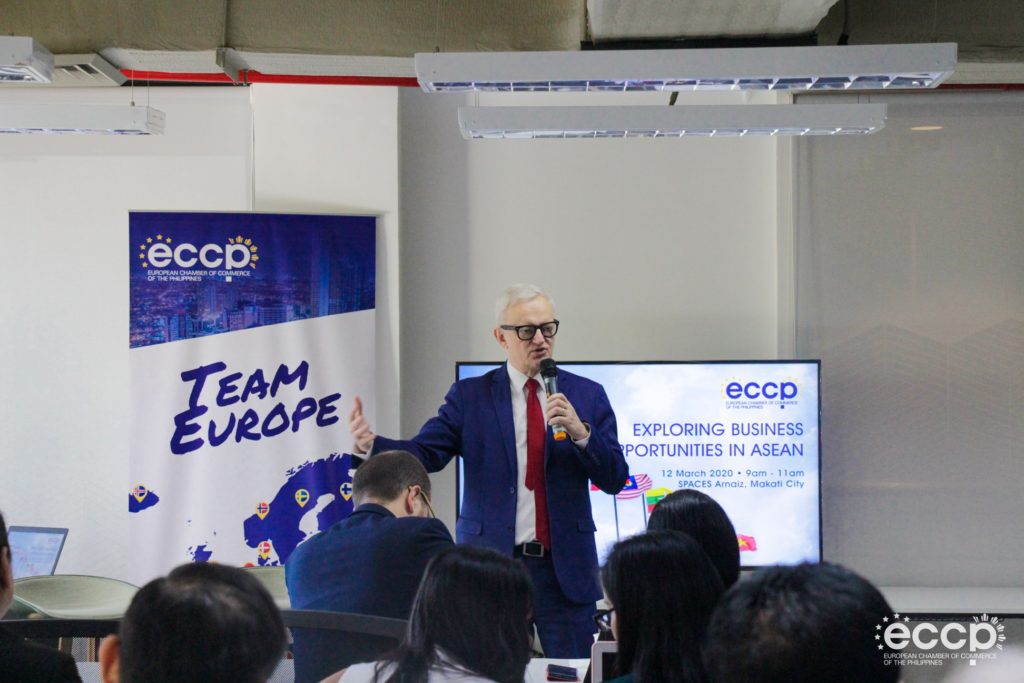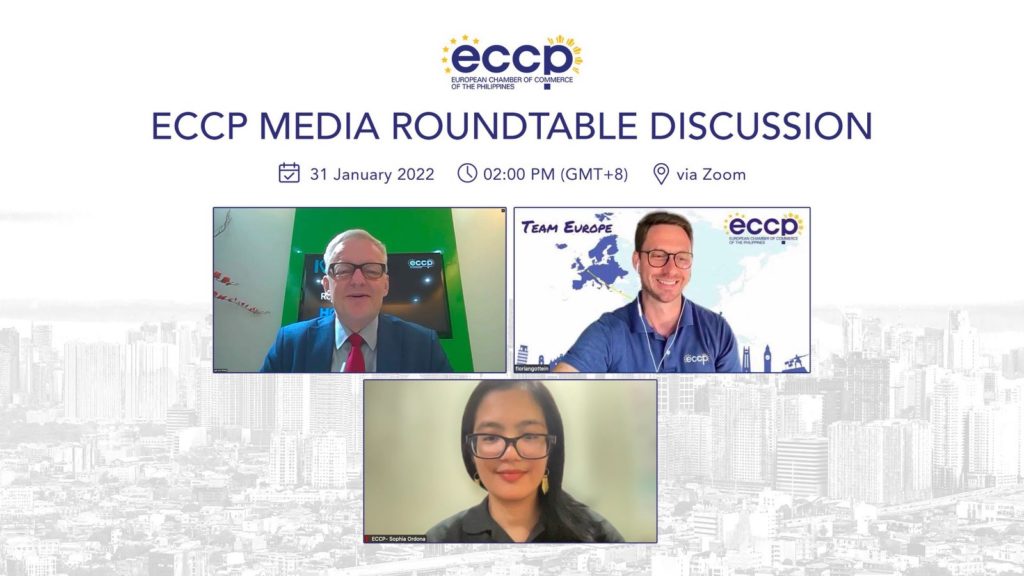
On 31 January 2022, The European Chamber of Commerce of the Philippines (ECCP) held a virtual media roundtable discussion with the ECCP President, Lars Wittig.
The discussion presented ECCP’s views on the Philippine economy for 2021 and 2022, as well as the Chambers milestones and plans, upcoming flagship events, and legislative and economic reform priorities. The event also emphasized the Chamber’s efforts in strengthening ties with the private sector and government partners, European Chamber regional counterparts, and fueling the growth of ECCP members in their regional offices.
Wittig affirmed that the Chamber has continued to provide support to the European-Philippine business community and the government in recovering from the repercussions brought about by the COVID-19 pandemic. For the past year, the ECCP achieved numerous milestones, in collaboration and with the significant support of its partners from the members of the business community, as well as the Philippine and European governments. In June 2021, the Chamber held its first Europa Awards, which recognized companies that demonstrated best practices on sustainability in the areas of energy, circular economy, mobility, food and nutrition, green finance, and water resource management.
In September, the ECCP held the eighth European-Philippine Business Summit, it’s flagship event which tackled the European-Philippine economic partnership, as well as key developments and policy directions in the country. The Chamber has also remained active in its engagements, having had over 200 dialogues with various industry representatives and government decision-makers. The Chamber also launched its 2021 ECCP Advocacy Papers on several sectors.
On the Philippine pandemic response and economic performance, Wittig underscored that vaccination and easing of mobility restrictions are among the important elements to safely reopen the economy. “We recognize the heightened and fast-tracked efforts in inoculating more individuals, including the commencement of pediatric vaccination and booster administration in late 2021. We truly hope we can keep the momentum,” said Wittig.
He added that the Chamber welcomes the move to ease the entry of foreign nationals into the Philippines. Last 27 January, the Inter-Agency Task Force for the Management of Emerging Infectious Diseases (IATF) issued Resolution No. 159 that temporarily suspends the country risk classifications, and allows the entry of fully vaccinated nationals of non-visa required countries.
Looking at the Philippine economic climate, the ECCP underscored that lifting barrier on foreign investment and promoting ease of doing business are among the crucial aspects that will significantly support the country’s economy. Recently, the Philippine Statistics Authority reported a 5.6% full-year GDP growth for the year 2021, slightly higher than the 5.0-5.5% projection, while the government’s growth target for 2022 is 7.0-9.0%.
Wittig stated, “In order to capitalize on this progress in economic recovery, the Philippines must act quickly in terms of carrying out economic reforms that further trade and investment activities, and will drive the country’s competitiveness and attractiveness to foreign investors.”
The Chamber lauds the enactment of the Retail Trade Liberalization Act amendments, a reform that Wittig said is “instrumental in allowing foreign players to invest in the dynamic retail trade sector”. He added that the passage of the amendments to the Public Services Act will leverage the country’s potential to achieve comparable levels of foreign investments in other ASEAN member states. The European Union (EU) is by far the largest investor in the ASEAN region. However, only 4.6% of the EU’s 2019 USD313 billion FDI stock has been invested in the Philippines.
Meanwhile, on the trade relations of the EU and the Philippines, the ECCP president encouraged the maximization of the GSP+ utilization, underscoring that the Philippines is the only ASEAN country beneficiary of this trade preference scheme. In 2020, the Philippines was the 2nd biggest beneficiary country of the GSP+, following Pakistan.
Additionally, Mr. Wittig highlighted the plethora of opportunities that may come with RCEP Ratification, commenting that it will “complement other welcomed economic reforms launched by the administration with the amendments to the Foreign Investment Act, Retail Trade Act, and Public Services Act to show the world that the fast-growing Philippine economy is an increasingly attractive location for new and expanding foreign investment”.
In terms of ECCP operations, ECCP President Lars Wittig announced a milestone — the Chamber is looking to open an ECCP branch in Western Visayas, particularly in Iloilo City, by the end of the first quarter of 2022. Currently, the Chamber has offices in Manila, Northern Luzon, Visayas, Northern and Southern Mindanao.
Wittig also provided an overview of the Chamber’s line-up of activities for 2022. Among these include the launch of its Doing Business in the Philippines publication, as well as pillar events that focus on sustainable development, such as the Europa Awards, Sustainable Agriculture Forum, and Energy Smart Forum. Likewise, the ECCP will hold the ninth run of the European-Philippine Business Summit this year.





